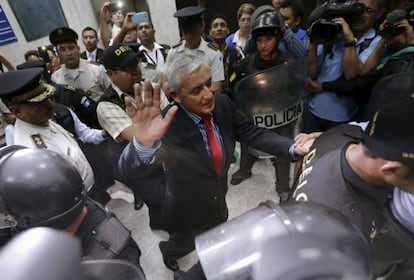How the Línea corruption scandal toppled Guatemala’s government
The investigation that led to President Otto Pérez Molina’s resignation began in May 2014

The La Línea (The line) investigation is not the only corruption case in Guatemala and it may not even be the largest. But it will be remembered as the spark that ignited the country’s so-called Revolution of Dignity – a movement against a state working in collusion with organized crime that has turned the Central American country into an example of how a people can reclaim its power.
But what is La Línea? And how did its breakup bring down a government that will be remembered for the levels of its indecency and its unabashed plundering of a nation?
Investigators obtained 66,000 wiretaps implicating several government officials in a customs fraud ring
In May 2014, the International Commission against Impunity in Guatemala (CICIG) and the Special Prosecutor Against Impunity launched an investigation after receiving reports saying that a group of importers, with the help of customs officials, were falsifying documents in order to pay lower tariffs on merchandise entering the country.
The group called itself La Línea in reference to a telephone line that tariff evaders used to contact their accomplices within the government, who would help them falsify the content descriptions of their trucks on official paperwork.
Over the next eight months, the prosecutor and the CICIG obtained more than 66,000 wiretapped conversations between the members of the group, more than 6,000 emails, and other evidence that would support their case.
More than 100,000 Guatemalans took to the streets to call for the president’s immediate resignation
On April 16, authorities detained the head of the Guatemalan tax office – the first sign that things were finally changing in a country where organized crime organizations had been infiltrating the government for decades. CICIG Commissioner Iván Velásquez, a Colombian judge, gave a press conference in which he outlined the structure of the customs fraud ring and former Vice President Roxana Baldetti’s personal secretary, Juan Carlos Monzón, was named in the case.
At the time, Monzón was with the vice president in South Korea where she was receiving an honorary doctorate from a little-known university. Once back in Guatemala, Baldetti lied about the date of her return. Later, she admitted telling her personal aide that he was wanted in Guatemala but could not explain why he had failed to come back with her and instead fled. Monzón, who was involved in a long list of shady businesses involving various government agencies, remains at large.
That was the beginning of the end for Baldetti. The former vice president resigned in May 2015 and now sits in police custody awaiting trial. Unofficial sources say three Florida judges are working on a case to extradite her for money laundering. Neither the US nor the Guatemalan governments have confirmed or denied this information.
But Commissioner Iván Velásquez and Guatemala Attorney General Thelma Aldana were holding back on the most shocking discovery. On August 28, the two held a press conference in which they accused President Otto Pérez Molina of being the ringleader of the customs fraud scheme and called on the Supreme Court to strip him of his immunity. That same day, a court ordered Baldetti to be placed in preventive prison.
It was the straw that broke the camel’s back. By conservative estimates, more than 100,000 Guatemalans took to the streets to call for the president’s immediate resignation. On Tuesday, Congress, including members of Pérez Molina’s own party, voted to officially strip the president of his immunity.
The president announced his resignation through his spokesman Jorge Ortega at 1.30am on Thursday and, later that morning, he stood for a hearing before Judge Miguel Ángel Gálvez, who ordered his immediate imprisonment. That night, the retired general and former head of state slept in a prison cell for the first time.
Tu suscripción se está usando en otro dispositivo
¿Quieres añadir otro usuario a tu suscripción?
Si continúas leyendo en este dispositivo, no se podrá leer en el otro.
FlechaTu suscripción se está usando en otro dispositivo y solo puedes acceder a EL PAÍS desde un dispositivo a la vez.
Si quieres compartir tu cuenta, cambia tu suscripción a la modalidad Premium, así podrás añadir otro usuario. Cada uno accederá con su propia cuenta de email, lo que os permitirá personalizar vuestra experiencia en EL PAÍS.
¿Tienes una suscripción de empresa? Accede aquí para contratar más cuentas.
En el caso de no saber quién está usando tu cuenta, te recomendamos cambiar tu contraseña aquí.
Si decides continuar compartiendo tu cuenta, este mensaje se mostrará en tu dispositivo y en el de la otra persona que está usando tu cuenta de forma indefinida, afectando a tu experiencia de lectura. Puedes consultar aquí los términos y condiciones de la suscripción digital.








































